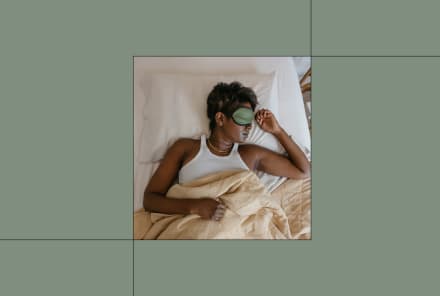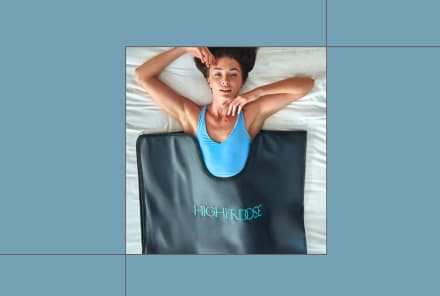Advertisement
Biohacking & Toxic Masculinity: How Women Dismantled The Boys' Club



Take a quick search for "biohacker" on TikTok (a tag with over 137 million views), and you'll discover a slew of men discussing their muscle gains, testosterone levels, and cold plunge routines. You'll see some women on the page, but the space is undoubtedly dominated by male energy. And think of the outspoken biohackers you may listen to on podcasts—chances are most of them are men, too.
This gendered approach to biohacking, while pervasive, is simply misguided. But now, women are asserting their authority in health optimization, and we expect their emphasis to soar in the year ahead.
Meet the experts
Molly Maloof. M.D.
Molly Maloof, M.D., provides health optimization and personalized medicine to high-achieving entrepreneurs, investors, and technology executives. Since 2012, she has worked as an advisor or consultant to more than 50 companies in the digital health, consumer health, and biotechnology industries. Her company, Adamo Bioscience, is working on sexual health optimization.
Gabrielle Lyon, D.O.
Gabrielle Lyon, D.O., is a board-certified family physician leading a disruption in modern medicine that focuses on the largest organ in the body: skeletal muscle. With a background that includes a combined research and clinical fellowship in geriatrics and nutritional sciences at Washington University and undergraduate training in nutritional sciences at the University of Illinois, she is a subject-matter expert on protein for health, performance, aging, and disease prevention.
Stacy Salvi
Stacy Salvi is the vice president of product and strategy at the medical device company Movano Health—the creator of the Evie Ring, the first health wearable designed for women.
Mona Vand, PharmD
Mona Vand, PharmD, studied pharmacy at Massachusetts College of Pharmacy and Health Sciences before developing her platform that shares holistic wellness advice.
Why biohacking isn't just for "bros"
"Women are the original biohackers," declares family physician, Molly Maloof, M.D. "Our hormones change throughout our lives, and this requires us to adapt accordingly." Our biology means that women often need to constantly edit their health routines and experiment with lifestyle habits as time goes on. Isn't that the very definition of biohacking?
Let's back up: Here at mindbodygreen, we think of "biohacking" as the practice of making lifestyle tweaks to optimize health and promote longevity. Not shortcuts—contrary to popular belief—but low-lift, everyday habits that complement and enhance an existing well-being routine. Think: optimizing your exercise regimen using tools and techniques (the "biohacks") to enhance muscle growth. It's essentially all about advancing health with "do it yourself" biology—a topic that can pique anyone's interest, regardless of gender.
"[Women] have a most complex physiological life cycle that requires us to track and manage fertility, pregnancy, breastfeeding, sexuality, perimenopause, and menopause. So we should be looking at biohacking as a path to even greater health and owning the opportunity to improve our lives," says Maloof.
Yet many women feel intimidated to enter the biohacking scene as it exists today, turned off by the male-dominated energy in the room.
Women are the original biohackers
"Biohacking has always grabbed my attention, and I want to learn, but it sometimes makes me really stressed out, because I go into this state of perfectionism where I have to do all the things," says doctor of pharmacy and wellness practitioner Mona Vand, PharmD. "The few biohackers that I followed were all males… it just doesn't really resonate with my energy."
This male energy is not only frustrating but can potentially harm women's health in the long run. After all, building muscle, prioritizing protein, and keeping an eye on various health metrics are crucial for longevity—in some cases, these proactive measures can save lives. When women don't get involved, it can totally impact their well-being.
"Physical strength is nonnegotiable," says functional medicine doctor Gabrielle Lyon, D.O. "I've been a physician since 2006, and I've never heard someone say, 'I regret being physically strong.'" And the muscle-building space impacts more than just physiological changes, she says. "You optimize fertility, you make healthier babies, you help the epigenetics of your child," Lyon adds. "You age better, your skin is better, you're less likely to fall and break a hip… There's nothing that doesn't get better the stronger you are."
So let's be clear: Dismantling the biohacking boys' club is not just about helping women feel included; there are real health implications at stake here.
Why the biohacker space actually really needs a dose of feminine energy
I'd be remiss not to mention how biohacking culture can easily become synonymous with hustle culture (some experts don't even like to use the term, as it implies you can achieve optimal health with quick fixes). But as more women enter the biohacking space, we expect it to become more intuitive and less about hitting every single benchmark. From there, we predict women will focus more on sustainable changes long-term instead of a gazillion quick hacks.
"I used to think it was a flex to do a million things at the same time and habit stack," Vand recounts. "I now carve out time for doing things that have no efficiency to them, that are strictly for joy or rest and relaxation, versus benefiting my longevity or health. It can be a little bit obsessive when you get into this thought pattern, and I just don't resonate with it."
This doesn't mean biohacking will become "softer" as it embraces feminine energy. But there's an opportunity here for women to introduce some much-needed flexibility into a space that has long felt needlessly rigid.
How the biohacker game is changing — and where it's headed next
Thanks to a growing awareness that health care protocols should not be gendered, more women are now starting to pay attention to markers of performance like lean muscle, hormetic stressors, VO2 max, HRV, zone 2 training, etc. "Cold plunging, saunas, and harder, more physical activities are not just for the boys anymore," adds Lyon—and we expect an even bigger shift to come in 2024.
"I think it's super exciting to see biohacking become more mainstream and more women joining the conversation," adds Maloof. She praises apps like Wild.AI, for women who aim to make lifestyle adjustments based on their menstrual cycle, and Zero, for women who want to dabble in time-restricted eating, both of which have helped to herald the shift.
Other existing health optimization companies are now inviting women into the conversation by introducing specific features informed by their unique physiology. WHOOP, for example, is currently working on upgrades to their popular health-tracking band: "We did a study recently where we learned a lot about how a woman's body changes during pregnancy and how her heart rate variability (HRV) will evolve. It'll decrease, and then about seven weeks before she gives birth, it will increase sharply," explains Will Ahmed, WHOOP founder and CEO, on the mindbodygreen podcast.
If a woman didn't know that this was supposed to happen, she might look at this stark increase with a critical (or anxious) eye. "We've been able to take population-level data on pregnant women and now have a feature in the app, where a woman can see how her body is evolving alongside what other pregnant women are experiencing," he adds.
Similarly, creatine supplements—from the ingredients to the packaging—are no longer marketed toward dudes looking to bulk up, and we are certainly here for it. After all, muscle mass is a predictor of longevity and healthspan, so supplements that promote it can help all of us "hack" our health in a big way.
And as Lyon notes, women have lower endogenous creatine stores compared to men (meaning, they have less available). And the amino acid has been associated with significantly increased muscle mass1 in both men and women, without increasing the risk of adverse outcomes2, like weight gain. "Most of the women in my practice will go on creatine, and they find anecdotally that it really improves both anaerobic and aerobic exercise performance," Lyon shares.
Not to mention the supplement's brain health perks: Taking creatine has been shown to benefit both working memory and processing speed3 as well as cognitive longevity4. "It is above and beyond simply sport performance," adds Lyon, who has certainly seen an uptick in women curious about creatine.
As women feel intimidated (or even restricted) by biohacking spaces, some experts have taken it upon themselves to create new ones that center the feminine. For example, neuropsychophysiologist Kayla Osterhoff, MPH, offers a Women's Biohacking Mini Course, consisting of lifestyle routines and tips aligned with female physiology.
Osterhoff also recently presented at the 2023 Dragonfly Live Conference—among other female biohackers—to discuss the latest advancements in women's well-being and the "health revolution" that's sweeping the mainstream. This conference aims to gather the "who's-who" in the health space to discuss cutting-edge strategies and innovations that optimize well-being—by having women biohackers at the forefront of the conversation, we can expect them to hit the main stage in a broader sense.
Or take the brand new Evie Ring, the first health wearable designed for women, created by medical device company Movano Health. The technology ties hormonal information to a woman's sleep, activity, and heart health data (among other metrics).
For instance, "If we notice a more restless night of sleep in the luteal phase, we'll point it out and also give some strategies for how somebody may attack their day, despite having not gotten as good of a night of sleep," says Stacy Salvi, vice president of product and strategy at Movano Health. Similarly, "We know that there are cardiovascular implications when your estrogen drops, so they would want to keep a better look on the function of their heart," she adds. "This would be something that they would be able to do from our app."
Even the design itself was made with women in mind: The ring features an open band meant to accommodate how women's fingers change in size throughout the day, so it can stay comfortable.
To avoid needless stress, Evie also limits the amount of goals you can set on the app. "You can only set three at a time because we do not want to overwhelm [users] with a bunch of different things," says Salvi. "I mean, I'm an overachiever. I probably would set every single goal and then fail at them." And heaven knows we don't need yet another way for busy, overwhelmed women to feel like they're failing in a society with unsurmountable standards.
Forecasting the future
A woman walks up to the weight rack in 2024. She sees the usual suspects—bros pounding protein shakes and grunting through their bicep curls—but now she also sees a fair amount of women on the scene. They've got creatine supplements! Fitness trackers! Kettlebells! (And no, they aren't pink.)
Granted, we still have a ways to go before women feel totally embraced by the biohacking space (we'd first have to close the centuries-long gender gap in science and medicine), but it's clear that the arena is becoming way less of a boys' club. "And the world is ready, my friend," says Lyon. "The world is absolutely ready for this."
Watch Next
Enjoy some of our favorite clips from classes
Enjoy some of our favorite clips from classes
What Is Meditation?
Mindfulness/Spirituality | Light Watkins
Box Breathing
Mindfulness/Spirituality | Gwen Dittmar
What Breathwork Can Address
Mindfulness/Spirituality | Gwen Dittmar
The 8 Limbs of Yoga - What is Asana?
Yoga | Caley Alyssa
Two Standing Postures to Open Up Tight Hips
Yoga | Caley Alyssa
How Plants Can Optimize Athletic Performance
Nutrition | Rich Roll
What to Eat Before a Workout
Nutrition | Rich Roll
How Ayurveda Helps Us Navigate Modern Life
Nutrition | Sahara Rose
Messages About Love & Relationships
Love & Relationships | Esther Perel
Love Languages
Love & Relationships | Esther Perel
What Is Meditation?
Box Breathing
What Breathwork Can Address
The 8 Limbs of Yoga - What is Asana?
Two Standing Postures to Open Up Tight Hips
How Plants Can Optimize Athletic Performance
What to Eat Before a Workout
How Ayurveda Helps Us Navigate Modern Life
Messages About Love & Relationships
Love Languages
Advertisement

This Little-Known Supplement Helps Women Sleep & Decreases Signs Of Depression
Molly Knudsen, M.S., RDN

This Little-Known Supplement Helps Women Sleep & Decreases Signs Of Depression
Molly Knudsen, M.S., RDN















